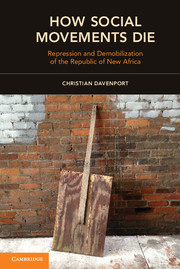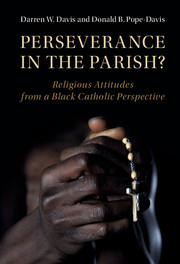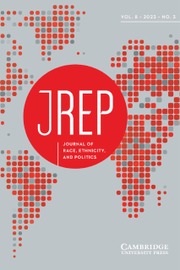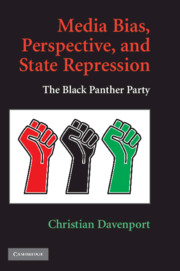How Social Movements Die
Repression and Demobilization of the Republic of New Africa
$82.00 (C)
Part of Cambridge Studies in Contentious Politics
- Author: Christian Davenport, University of Michigan, Ann Arbor
- Date Published: December 2014
- availability: Available
- format: Hardback
- isbn: 9781107041493
$
82.00
(C)
Hardback
Other available formats:
Paperback, eBook
Looking for an examination copy?
If you are interested in the title for your course we can consider offering an examination copy. To register your interest please contact collegesales@cambridge.org providing details of the course you are teaching.
-
How do social movements die? Some explanations highlight internal factors like factionalization, whereas others stress external factors like repression. Christian Davenport offers an alternative explanation where both factors interact. Drawing on organizational, as well as individual-level, explanations, Davenport argues that social movement death is the outgrowth of a coevolutionary dynamic whereby challengers, influenced by their understanding of what states will do to oppose them, attempt to recruit, motivate, calm, and prepare constituents while governments attempt to hinder all of these processes at the same time. Davenport employs a previously unavailable database that contains information on a black nationalist/secessionist organization, the Republic of New Africa, and the activities of authorities in the U.S. city of Detroit and state and federal authorities.
Read more- Utilizes new, disaggregated, micro-foundational, and organizational data
- Analyzes material via innovative and dynamic theory
- Discusses a previously unknown history concerning an African American social movement organization and the extensiveness of the state repression directed against it
Reviews & endorsements
"Marshalling insightful analysis, brilliant archival research, and extensive knowledge, Davenport explains the emergence, growth, and demise of social movements. This book is a real gem."
Scott Gates, Peace Research Institute Oslo and Norwegian University of Science and TechnologySee more reviews"Through a meticulous analysis of a single case - the Republic of New Africa - Christian Davenport presents us with new theoretical insights into the external forces and internal dynamics that can eventually lead to the demise of a social movement organization that at its inception was at the forefront of a broader movement. His analysis of archival information on both overt and covert forms of state repression as well as his scrupulous analysis of RNA internal documents present us with innovative methods and novel lessons for the study of how social movement organizations emerge and eventually die."
T. David Mason, University of North Texas"Through a fascinating case study of the Republic of New Africa, Christian Davenport brings his expertise on political repression to bear on a question that has, oddly, been largely neglected by scholars: how and why do social movements die? Drawing on unusually rich data that take us inside the thought processes of movement actors as well as their opponents, Davenport offers deep insight into both the rise and demise of social movement organizations."
Rory McVeigh, University of Notre Dame"There is a great deal to admire about this book from its astonishingly rich data and thorough analysis to its clear theorizing about an important and nettlesome issue in the study of repression (What are the consequences of repression?) to its call for research on demobilization."
American Journal of Sociology"… the book will be useful for scholars interested in demobilization of social movement organizations or the general impact of state repression on movements, organizations, and individuals."
Ahsan Kamal, Oxford University Press Journals: Social ForcesCustomer reviews
Not yet reviewed
Be the first to review
Review was not posted due to profanity
×Product details
- Date Published: December 2014
- format: Hardback
- isbn: 9781107041493
- length: 366 pages
- dimensions: 229 x 24 x 152 mm
- weight: 0.71kg
- contains: 27 b/w illus. 2 tables
- availability: Available
Table of Contents
Introduction
Part I. Theory:
1. Killing social movements from the outside or the inside
2. Killing social movements from the outside and the inside
Part II. Case:
3. Repression and red squads
4. Record keeping and data collection
Part III. Origins:
5. We shall overcome?: From GOAL to the Freedom Now Party
6. We shall overthrow!: from the Malcolm X Society to the Republic of New Africa
Part IV. Examination:
7. Birth of a black nation
8. To Ocean Hill–Brownsville and b(l)ack
9. New Bethel and the end of the beginning
10. When separatists separate
11. Mississippi: the last stand(off)
Part V. Conclusion:
12. Understanding the death of social movement organizations.
Sorry, this resource is locked
Please register or sign in to request access. If you are having problems accessing these resources please email lecturers@cambridge.org
Register Sign in» Proceed
You are now leaving the Cambridge University Press website. Your eBook purchase and download will be completed by our partner www.ebooks.com. Please see the permission section of the www.ebooks.com catalogue page for details of the print & copy limits on our eBooks.
Continue ×Are you sure you want to delete your account?
This cannot be undone.
Thank you for your feedback which will help us improve our service.
If you requested a response, we will make sure to get back to you shortly.
×









